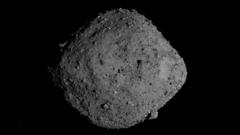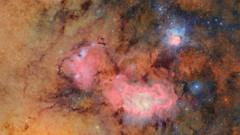Scientists have unveiled groundbreaking discoveries from asteroid Bennu, revealing that the rocky body harbors essential chemical building blocks of life. Analyzing samples collected by NASA's Osiris-Rex spacecraft, researchers found a trove of minerals and thousands of organic compounds in the asteroid's granulated dust.
Among these organic compounds are amino acids—crucial for protein formation—and nucleobases, which are integral components of DNA. While these findings do not imply that life ever existed on Bennu itself, they strongly support the theory that such essential ingredients were delivered to Earth by asteroids crashing into our planet billions of years ago. Furthermore, these same compounds could have similarly been transferred to other celestial bodies within our Solar System.
“What we have learned is extraordinary,” commented Professor Sara Russell, a cosmic mineralogist at London’s Natural History Museum. “It helps us understand our origins and allows us to address fundamental questions about the very beginnings of life. Everyone has a curiosity about how life started.”
The research, detailed in two papers published in the renowned journal Nature, follows Osiris-Rex's daring mission to collect samples from the 500-meter wide mound of boulders, rocks, and rubble that constitutes Bennu. The spacecraft successfully gathered approximately 120 grams of black dust and returned it to Earth in 2023, providing researchers worldwide a rare glimpse into the composition of this ancient asteroid.
“This sample may seem small, but it contains immense value,” explained Professor Russell. “Every grain reveals unique insights about Bennu.” Of great interest is the discovery of nitrogen and carbon-rich compounds, including 14 out of the 20 amino acids vital for life on Earth and the four nucleotide bases that form DNA—adenine, guanine, cytosine, and thymine. The presence of various minerals and salts indicates that water may have once existed on Bennu, alongside ammonia, which plays a vital role in biochemical processes.
While some of these compounds were previously detected in space debris, many had not been seen in such combinations until now. "The richness of the material is phenomenal," Professor Russell added, noting that the unique mixture of minerals provides a fresh perspective on asteroids, different from those examined before.
The latest findings reinforce the hypothesis that asteroids were instrumental in delivering not just organic material but also water to our planet. "The early Solar System was chaotic, filled with asteroids like Bennu crashing into nascent worlds," commented Dr. Ashley King from the Natural History Museum. "These celestial bodies likely seeded early Earth with the very ingredients that gave rise to our oceans and ultimately, life."
Though Earth is currently the only known planet harboring life, Dr. King emphasized that similar deliveries of carbon and water to other worlds could prompt the emergence of life under the right conditions. “A major question facing us is, given the right circumstances, how did life develop uniquely on Earth, and what are the chances of finding it elsewhere in our Solar System?” he stated.
The new findings signify just the beginning as researchers anticipate decades of exploration ahead with Bennu’s dust, while contemplating other regions of our cosmic neighborhood waiting to divulge their secrets.


















